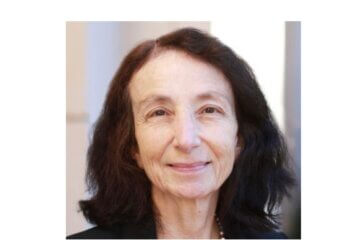
Last year, Acorns surveyed a group of consumers and found that nearly 60% of respondents didn’t invest at all in 2022. That means they didn’t set aside money that could grow into even more money over time. From talking to thousands of people, we know this lack of financial independence isn’t due to a lack of interest.
Instead, the barrier is often a lack of confidence.
I know firsthand how challenging it is to overcome the stress of personal financial management. I had checks bounce. I’ve been in debt. I’ve been between jobs. Then, I realized that the information on how to achieve financial independence was accessible to me. From that moment, I dedicated myself to learning everything I could, because there’s plenty of pie to go around, if you know how to get your slice.
Financial independence can look different for everyone. It can even look different for each of us at different stages of life. For me, years ago, it looked like buying my first house. Then, it looked like starting a family.
More recently, financial independence allowed me to embark on a full-time travel year with my husband and our 4 kids. We sold our house, our car, our furniture—most of what we own—to traverse North America in a big, white van, staying in short-term rentals along the way.
Embarking On Our Journey
It’s been the journey of a lifetime, but the journey started long before we hit the road.
Travel has always been a pillar of my life. As a globally competitive junior tennis player, I lived in tennis academies, and traveled almost every week for tournaments. During college, I sought work with an international travel guide, and managed a band that had gigs across the Northeast every weekend. I pursued an advanced degree in London, mostly because it seemed like the best launch pad to explore Europe. It was.
My career has provided similar opportunities to explore and experience different cultures, and share those stories. After a stint in entertainment journalism, I migrated to brand building and content development, working from San Francisco to New York to Washington D.C.
Sitting in one place for too long has just never sat well with me.
So when the opportunity to travel full-time with my family presented itself, I couldn’t say no. But that decision didn’t happen overnight. Actually, it took years of careful financial planning. We had a goal, and pointed our money decisions towards it. We saved and invested regularly, even small amounts, and over time, they added up. We set recurring investments, and invested spare change from every purchase. Then, we left it alone. Forgot about it. And sure enough, it gave us options.
Budgeting For The Remote Life
As we approached go-time, we prepared a budget together. What was our lodging budget? Gas? Experiences? What did we want to save and invest along the way? Then, we stuck to it.
My husband and I have also been able to work remotely for years, which provides a necessary level of flexibility for this travel life. It also meant I could homeschool our school-aged kids. And yes, a lot of that schooling is centered around money and how to develop smart financial habits early.
Almost a year into this adventure, I can say it’s been more than we could have dreamed. From whale watching in Alaska to skipping down the Hollywood Walk of Fame to living on a sheep farm in rural Washington, we’ve seen and done things we’ll never forget.
Personally, I have bonded with my 4 children in ways I didn’t know possible, and have watched their confidence explode as they try new foods, meet new people, and make new friends. My gratitude for my marriage has grown exponentially, and we’ve become more resourceful and smart with our decisions, including money. It helps a lot that home expenses and yard care are not part of our reality.
Plus, the kids have been able to experience how this all came together, financial planning included. When we take out our play money at school, we pretend we need gas, groceries, and a ticket to a museum. These real-life examples help them wrap their minds around the importance of understanding money. They get that none of this would have been possible if we hadn’t committed to financial planning.
Goal Setting That Lasts A Lifetime
I’m grateful for the opportunity to instill these lessons early at home. The unfortunate truth is that four in five adults say they never received financial education in school. As a country, we’re making strides, but we’re still graduating kids who don’t understand the dangers of debt, and how to avoid it.
We’re letting kids out into the world without the tools they need to succeed in it.
Together, we can change this. We can insist that our schools add financial education to the early childhood curriculum. We can give our kids more guided financial independence with products like GoHenry by Acorns. We can simply involve them in money conversations and decisions around the house.
Progress takes time, but it’s happening. Gen Z’ers would prefer to use debit cards because they want to live within their means. There are even products out there, like the Mighty Oak Debit Card, that offer industry high yields, so people’s money has the chance to do more than sit idly in an account.
Scaled financial independence starts with making money a part of our mainstream conversation, with our friends, our partners, our kids, and ourselves. Ask the “dumb” questions. Instead of scrolling on social media, read a free article from Acorns Learn about how to invest. Seek help. I promise, it’s here for you.
If you still don’t know where to start, try this: set a goal. Now, work backwards from that goal. What do you need financially to achieve it? If something happens that sets you back, what do you need in a savings account to cover it? Looking at your monthly budget, where can you automate your saving and investing, so you don’t even have to think about it?
Success isn’t perfect. It’s a little progress every day. All you have to do today is get started, and ask yourself, “What’s the best that could happen?”
Kennedy Reynolds is the Chief Education Officer at Acorns, one of the largest subscription services in U.S. consumer finance specializing in making investing accessible to everyday Americans.
READ MORE:
- The Biggest Money Mistakes Women Make At Every Age
- How to Forgive Yourself For Financial Mistakes And Move On
- How to Close The Gender Pay Gap Once And For All
Join us in the private HerMoney Facebook group – where we’re having an ongoing conversation about all things finance in a judgment-free zone.







